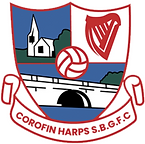The official site for Corofin Harps Schoolboys and Girls Football Club
Our Code of Conduct
Manager/Coaches Code:
-
As a coach of underage teams, you must act as a guardian and as such your duty of care is of high importance.
-
On all occasions where child members for the club come together for the purpose of club activities there should be 2 adults present at all times.
-
Young People need a coach whom they respect, lead by example.
-
Be generous with your praise.
-
Never ridicule or shout at players for making mistakes or losing a game.
-
Teach your players to respect the rules of the game.
-
Ensure equal game time up to U11 and follow the PDP game time guide for U12 to U16. Coaches have discretion on game time for knockout competitions.
-
Do not tolerate fighting, foul play or use of bad language. Be prepared to take off players who offend against these rules.
-
Set realistic goals for your team.
-
Encourage players to develop basic skills and sportsmanship.
-
Create a safe and fun environment to train and play.
-
Ensure all players know that bullying – verbal or physical will not be tolerated under any circumstance.
-
Always thank match officials and respect their decisions; if you require clarification on any decision discuss with match official after the game.
Players Code:
-
Play for fun, enjoy training and games for yourself, and not to please coaches/parents.
-
Play by the rules of the game.
-
Always accept the referee's decision.
-
Play with control - never lose your temper.
-
Play for yourself and your team - the team's performance will benefit and so will your own.
-
Be a “good sport”. Applaud all good play by your own team and the opposition.
-
Treat all players with respect. Do not bully or take advantage of any player.
-
Co-operate with the coach, teammates and opponents.
-
Play fair, never intentionally hurt your opponent.
-
At the end of every game thank the referee and shake hands with your opponents.
Parents Code:
-
Remember young people are involved in sport for their enjoyment and not yours.
-
Encourage your child to play within the rules of the game.
-
Set a good example by applauding good play from both your child’s team and the opposition.
-
Never shout at young players for making mistakes or losing a game.
-
Do not force a child to play; let it be the child’s decision.
-
As a spectator, do not use bad language or harass referees, coaches or players.
-
Recognise the value of volunteer referees and coaches. They give their time to provide these activities for young people.
-
Encourage your child to respect both team-mates and opponents.
-
Instil in your child that it is not all about winning and place more importance on taking part in the sport.
